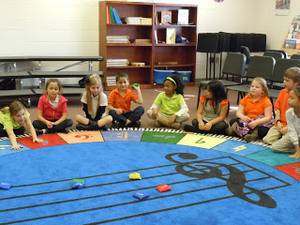
 T SEEMS TO BE the common experience of a number of musicians today who are very dedicated to realizing the Church’s high ideals for sacred music that they find themselves in the employ of a young (or young at heart) pastor who is only able to offer full time work if said musician is willing to play the organ at Mass, direct the choir, start a children’s choir and teach music in the school to grades pre-k through 8. First of all I want to thank those same pastors who are willing to go the extra mile to bring the greatest of arts to their young parishioners. Secondly I want to thank those musicians who are willing to embrace such a position simply because they love what they do.
T SEEMS TO BE the common experience of a number of musicians today who are very dedicated to realizing the Church’s high ideals for sacred music that they find themselves in the employ of a young (or young at heart) pastor who is only able to offer full time work if said musician is willing to play the organ at Mass, direct the choir, start a children’s choir and teach music in the school to grades pre-k through 8. First of all I want to thank those same pastors who are willing to go the extra mile to bring the greatest of arts to their young parishioners. Secondly I want to thank those musicians who are willing to embrace such a position simply because they love what they do.
It seems that I have received a number of emails of late from such musicians with questions regarding the musical training of the very young, especially pre-school aged children, kindergarten and lower level grade school students. Today I would like to share with you a few resources for those who might find themselves in front of a group of young children unsure of how best to proceed. Hopefully this post helps.
The first resource I would look into if I had to teach pre-k and kindergarten is Kindermusik. Kindermusik is based on a number of teaching philosophies, two of which are favorites of mine, those of Zoltan Kodaly and Maria Montessori. I do not profess to know everything about Kindermusik, but I have heard nothing but positive comments from those involved in the program. It engages the entire child vocally, intellectually, physically (and spiritually if done correctly, especially withing the context of a Catholic school). Music should primarily be enjoyable for children this age and Kindermusik makes that possible.
For those working with children in kindergarten through grade school (before junior high), I would heartily recommend the Kodaly Method of teaching music. It is primarily a vocal model for teaching music (although one could easily incorporate the use of instruments) and music literacy. Children sing lots of folk songs, which the teacher uses to carefully prepare, present and reinforce musical concepts. Be aware that this method requires a lot of preparation time on the part of the teacher, especially the first year, because the teacher has to make a number of manipulatives for use by each student and then make enough for each child in the class. If you go this route, purchase An American Methodology and its companion book of yearly lessons plans for grades k through 6 here. Be sure to include a lot of sailing songs and drinking songs (yes, I know) for the boys—they really like these.
To be honest, the hardest part about teaching is often how to teach, and the great thing about Kindermusik and the Kodaly Method, especially if you attend summer training sessions in them, is that you learn the art of teaching. I would also seek out the best teachers in your school and plaster them with questions continually. As long as you let them get home to supper each night, they usually enjoying passing on their knowledge. Anyway, I hope this helps.

